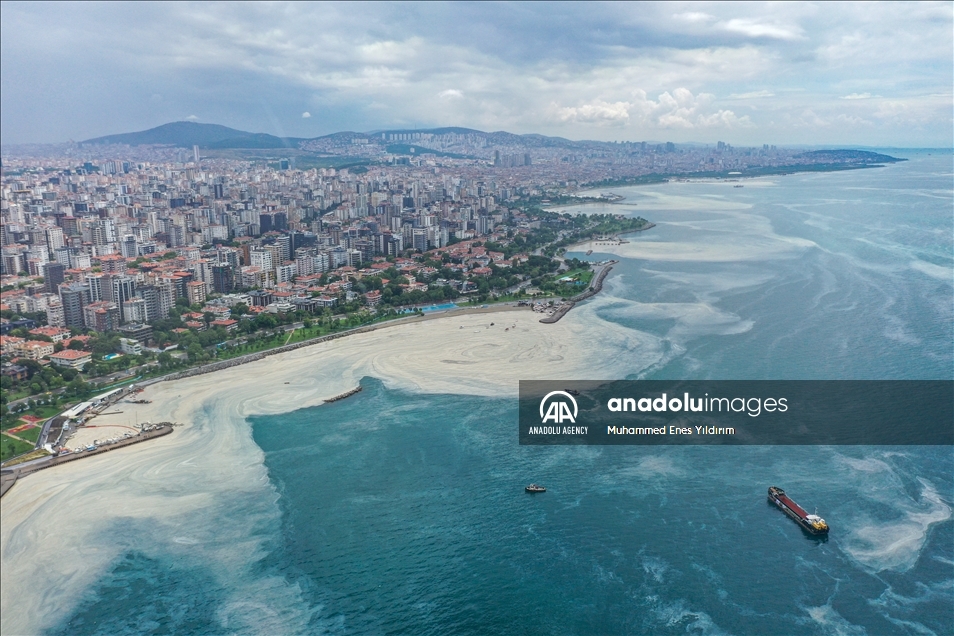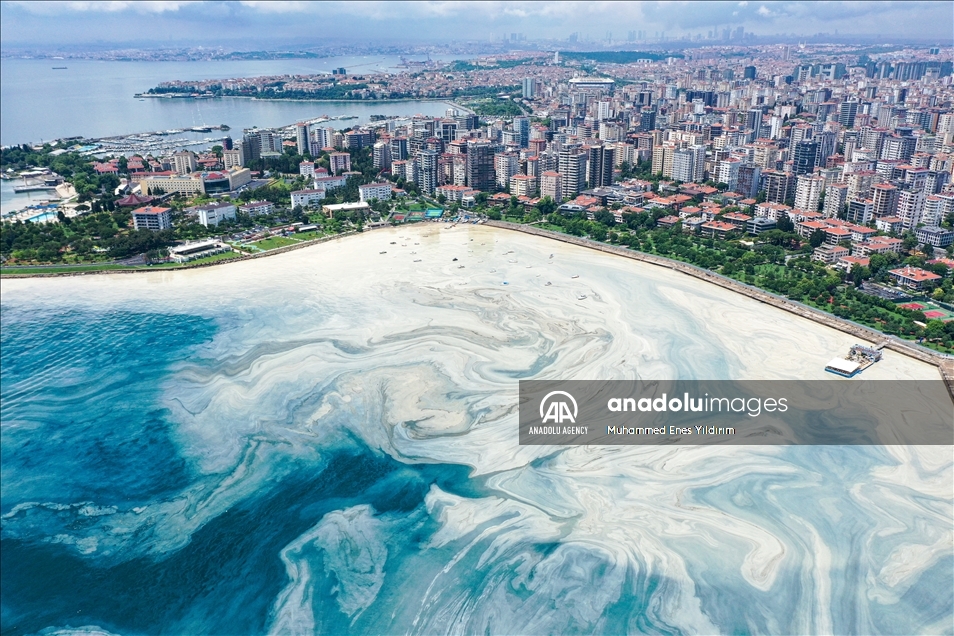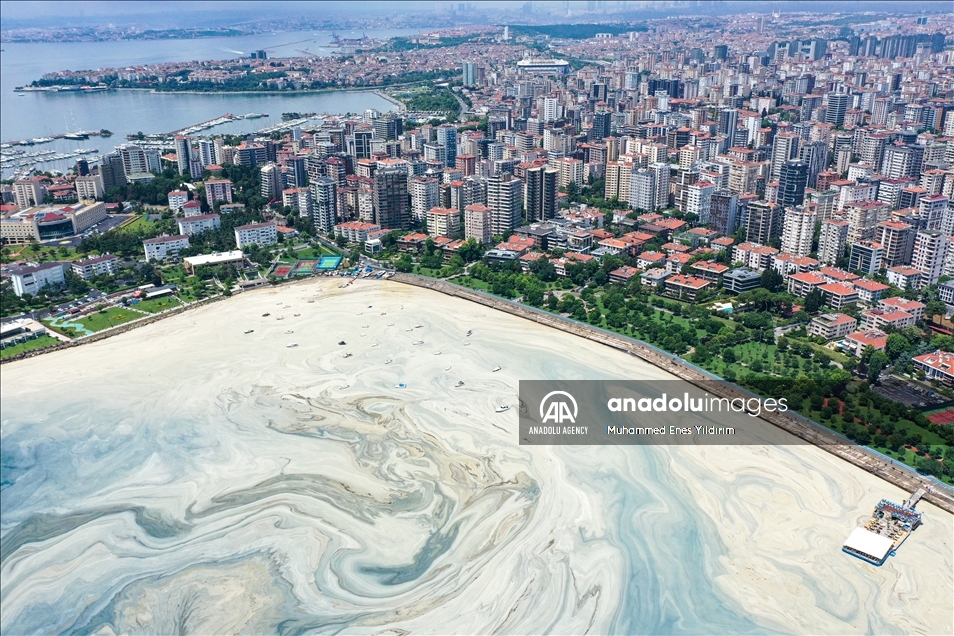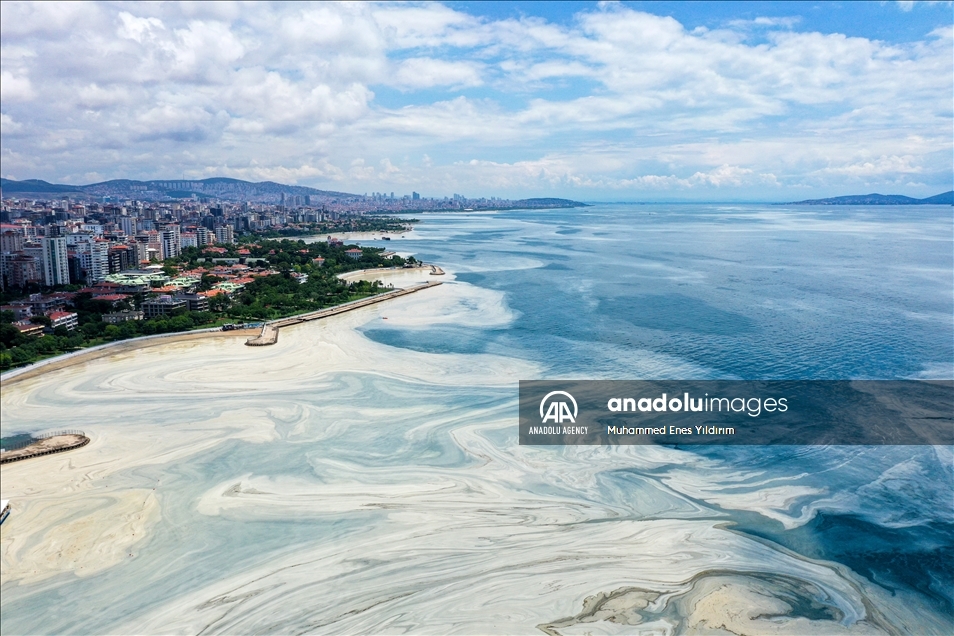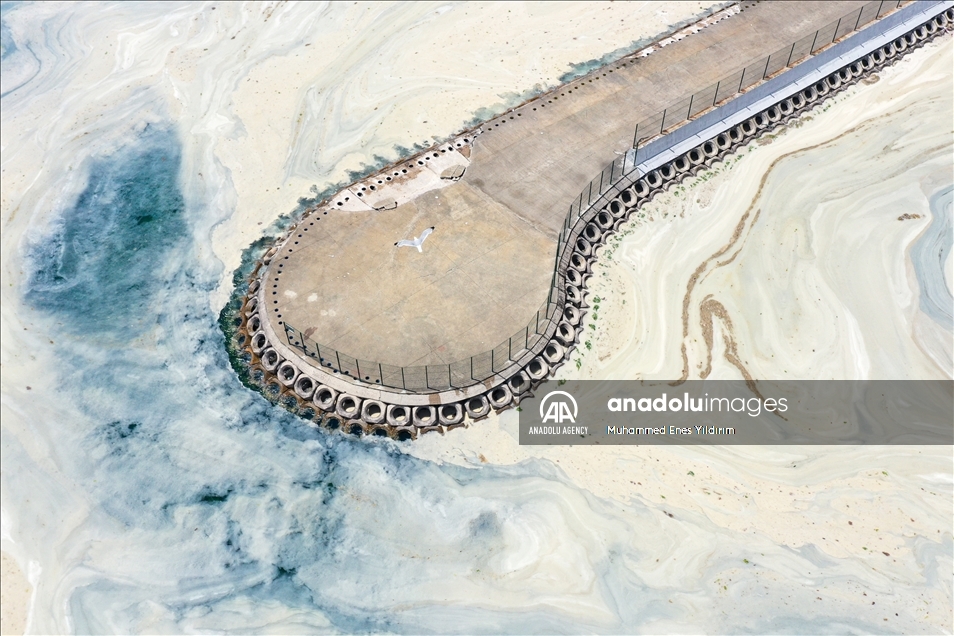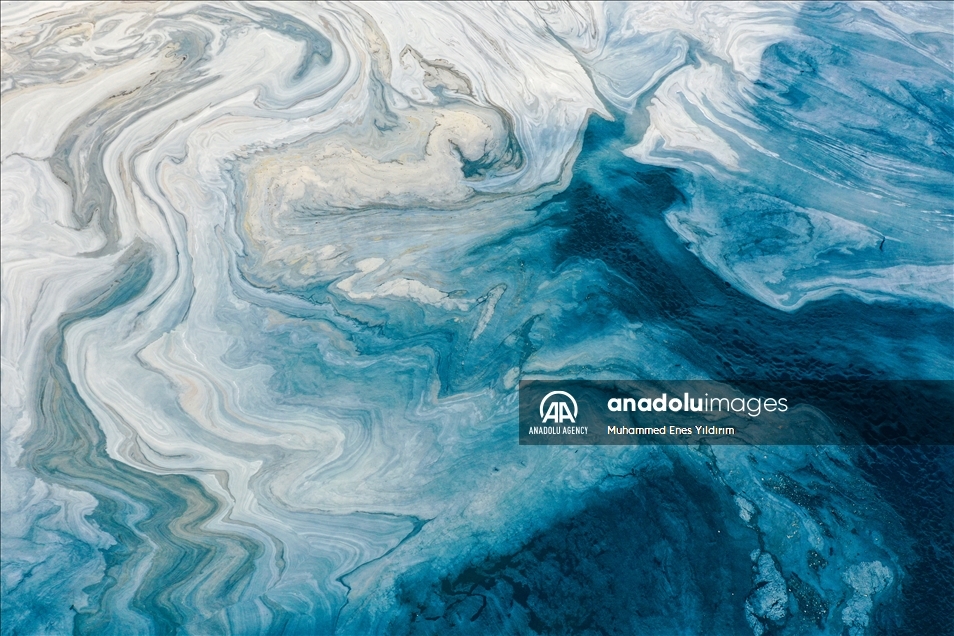Scientist warns of 'ecological disaster' intense mucilage may cause
'Conditions for formation of mucilage must be eliminated, otherwise we cannot cope with consequences,' says marine expert
 A drone photo shows an aerial view of the mucilage (sea snot) partly covering the surface of sea in Canakkale, Turkey on June 13, 2021. ( Ali Atmaca - Anadolu Agency )
A drone photo shows an aerial view of the mucilage (sea snot) partly covering the surface of sea in Canakkale, Turkey on June 13, 2021. ( Ali Atmaca - Anadolu Agency )
ANKARA
Marine mucilage is a usual part of the natural process, but the unusual spread of "sea snot" may cause an ecological disaster, according to a Turkish scientist.
Speaking to Anadolu Agency on the "mucilage outbreak" in Turkey's Sea of Marmara, Mustafa Sari, the dean of Maritime Faculty at Bandirma Onyedi Eylul University, noted that mucilage organism constitutes the first step of biological production in the sea.
"Mucilage, which is an event that can be seen more or less every year in the seas of the Mediterranean basin, is a secretion released by phytoplankton groups into seawater in response to changes and anomalies in sea conditions," he said.
Stating that mucilage was also intensely seen in the Marmara Sea in 1992, 2007 and 2008, although not as much as this year, Sari said that mucilage started in the autumn season and was visible until the end of May or the beginning of June.
He stressed that "polluting the sea," "structure of sea," and "rising seawater temperatures" are the main reasons behind the ongoing increase in mucilage in the Sea of Marmara.
"The increase in nitrogen and phosphorus due to the waste left by Turkish industry and 25 million people to the Marmara Sea without being treated properly for about 40 years has caused an available environment for the proliferation of phytoplankton groups ... In Marmara, which is a stable sea by its nature, a buffer that prevents the mixing of the Black Sea water on the surface and the Mediterranean water at the bottom ... As a result of global climate change, this year the Sea of Marmara became two degrees warmer than the average temperature of last 40 years."
He went on to say that the combination of those three triggering factors caused such a large number of tulle-like structures that stretch for meters on the surface and under the sea today, he added.
Sari said that the mucilage, which started in November last year and intensified in April this year, gradually began to cover the bays, gulfs, inner harbors, shelters and marinas on the surface and pointed out that what is now visible on the surface is the final stage of this process.
"If we consider the total volume of mucilage in the sea, the layer visible on the surface is not even 1/1000 of the mucilage present in the sea," he said, warning that the conditions for the formation of the mucilage must be removed. "Otherwise we cannot cope with the consequences."
'Ecological disaster'
"Intense mucilage is an ecological disaster for the marine ecosystem. The mucilage would sink on the seabed, completely engulf the underlying structure and create a new layer, and this would kill non-motile or immobile organisms such as mussels, oysters, and pen shells, especially sponges and corals," he said.
Stressing that millions of fish were killed during the expansion of mucilage in April, Sari noted that also fish larvae and eggs are highly at risk due to the ongoing presence of mucilage, as its damage to the fishing sector would be seen in coming years.
"The Sea of Marmara is a transitional sea between the Aegean Sea and the Black Sea. Therefore, a change occurring here affects the fishery in both the Aegean Sea and the Black Sea," he added.
He added that along with its potential dangers to the fishing industry, mucilage also affects the tourism sector around the Marmara Sea, which is in the form of small family businesses mostly for domestic tourists.
In response to a question on a possible risk of mucilage spread towards the Aegean Sea and the Black Sea, Sari said that he does not expect large amounts of spread in those two seas, but a few presence might be seen.
Touching on Marmara Sea Action Plan, which was unveiled recently by Turkey's Environment and Urbanization Ministry, Sari noted that if needed, steps are taken within the framework of the plan and if the sea is protected from wastes, the Sea of Marmara can enter a recovery trend within five years.
Mentioning the Adriatic Sea as another example of the sea that dealt with sea snot problem in 2007 and 2008, he said that the coastal countries had gathered to tackle mucilage problem and they mostly solved it with a long term plan and program in coordination.
'Transient event, will eventually abate'
Speaking to Anadolu Agency, Ian Boyd, a biologist at Scotland's University of St. Andrews, said that the ongoing mucilage issue in the Sea of Marmara is a transient event that will eventually disappear.
"It occurs all over the place where sea conditions allow, although the occurrence in Turkey does seem especially extensive," noted Boyd, who was also a chief scientific adviser at the UK Department for Environment from 2012 to 2019.
He said mucilage is formed mainly from organic compounds, usually from marine algae, that create a surface foam, he said that it is not necessarily a result of pollution or waste as it can happen naturally in the proper conditions.
"Temperature and added pollutants could exacerbate the production of foam, but it could be entirely natural," Boyd added.
He added it should be investigated further to understand the causes of mucilage in the Sea of Marmara.
On June 7, Turkish authorities announced a 22-point Marmara Sea Action Plan to tackle a recent surge in mucilage covering the surface of parts of the Sea of Marmara in the country's northwest.
The plan is being jointly carried out by the Environment and Urbanization Ministry, Transportation and Infrastructure Ministry and Agriculture and Forestry Ministry.
The health and interior ministries, among other bodies and non-governmental organizations and coastal municipalities under the coordination of governorships, are also taking part in the plan.






